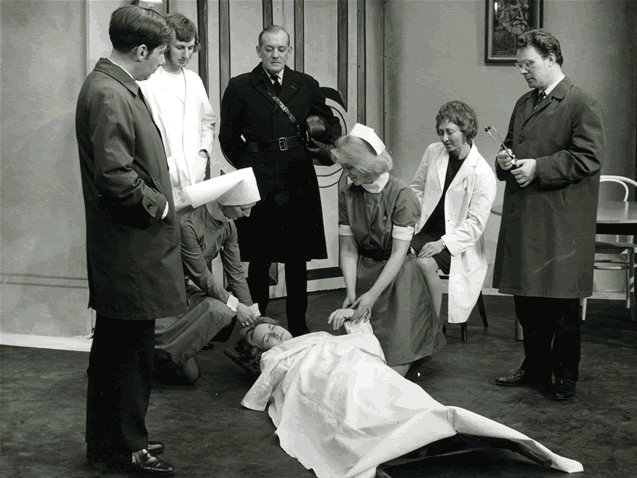Nuffield Theatre
onMonday 24th, Wednesday 26th to Saturday 29th January 1972
Friedrich Dürrenmatt's The Physicists is one of many physicist-centred dramas written in the 1950s and 1960s. At that time the potential that scientific innovation held was largely seen in the awesome destructive power of the atomic and hydrogen bombs. Science seemed to have outstripped man's ability to utilize it for the betterment of humanity. The Cold War, the arms race, and policies of mutually assured destruction suggested that instead science was too easily being used for bad -- indeed, literally world-threatening -- ends. Man could not be trusted with the knowledge that physicists were able to discover.
Dürrenmatt's physicists take one of the few options available to them to keep the knowledge they have from falling into hands ill-prepared to do what is best with it: they get themselves locked up in a mental institution.
The Physicists begins with a murder. A patient has murdered a nurse at the sanatorium. Because he is believed to be insane the criminal investigation is a largely superficial one. But the inspector does note his annoyance: three months earlier another patient had murdered another nurse.
Three physicists live together in the wing. One believes he is Einstein, one believes he is Newton (but occasionally tells people that he is in fact Einstein, though "in fact he really believes he is Newton"), and one understands that he is Johann Wilhelm Möbius but believes King Solomon talks to him. In fact, however, the three physicists are all sane.
Möbius feigns insanity because he discovered the "Unitary Theory of Elementary Particles". And he doesn't feel mankind is ready for the consequences:
The result is -- devastating. New and inconceivable forces would be unleashed, making possible a technical advance that would transcend the wildest flights of fantasy if my findings were to fall into the hands of mankind.
The men who pretend to be Einstein and Newton are physicists in the employ of intelligence services, representing the Western and Eastern powers of Cold War times, sent there to get Möbius' great discovery.
The murders of the nurses were necessary, because each grew too convinced that the patients were, in fact, sane. At the end of the first act Möbius finds himself with the same dilemma and sees murder as the only way to protect his secret.
Things are further complicated, in the form of the founder of the sanatorium, Fräulein Doktor Mathilde von Zahnd, who is the only one who appears truly mentally unstable. She too knows more than she originally let on, and before they know it the physicists find they have dug themselves a hole out of which they can not easily escape.
Dürrenmatt's comedy is very clever, and the situation he puts his characters in an ingenious and amusing one. The moral dilemma of the modern scientist no longer excites quite as much as it did at the height of the Cold War, but it is still a very effective play.
| The Cast | |
| Irene Straub | Angela Dean |
| Police Inspector Richard Voss | Graham Buchanan |
| Marta Boll, the matron | Ann Pennington-Legh |
| Blocher, a police photographer | Peter White |
| Guhi, a police stenographer | David Bartlett |
| Police doctor | Geoffrey Wharam |
| Policeman | Ronald Avery |
| Herbert Georg Beutler (Newton), a patient | Peter Neve |
| Fräulein Doktor Mathilde von Zahnd, alientist | Joy Steele |
| Ernst Heinrich Ernesti (Einstein), a patient | Kenneth Spencer |
| Frau Lina Rose | Betty Riggs |
| Oskar Rose, her husband, a missionary | Alan Newell |
| Adolf - Friedrich ) Wilfried - Kaspar ) their sons Jorg - Lukas ) |
Paul Cole Philip Manns Graham Barnes |
| Johann Wilhelm Möbius, a patient | David Pike |
| Monika Stettler, a nurse | Molly Manns |
| Uwe Sievers, chief male attendant | Michael Shailer |
| McArthur, male attendant | David Dudley |
| Murillo, male attendant | John Greenhouse |
| For the Maskers: | |
| Directed by | Judy Rake |
| Stage Manager | Keith Hooper |
| Assistant Stage Manager | Ron Tillyer |
| Production Assistants | Avril Woodward, Angela Stephens |
| Artistic coordinator | Ray Green |
| Wardrobe Mistress | Jo Bartlett |
| Lighting Design | Derek Jones |
| Lighting | Ivan White |
| Sound | W.J.Arnold, Geoff Grandy |
| Photographs | Serena Brown |
| Publicity | John Carrington |
